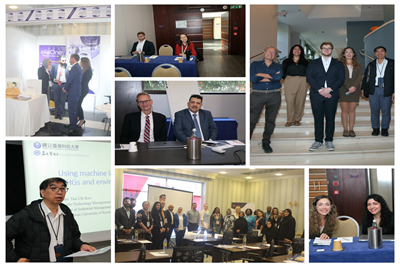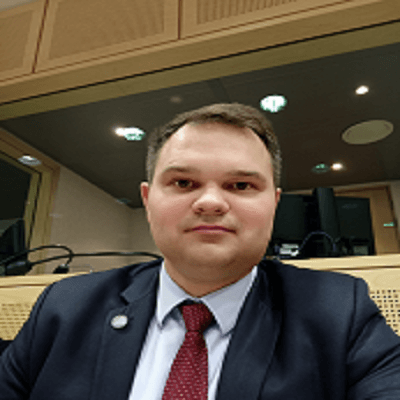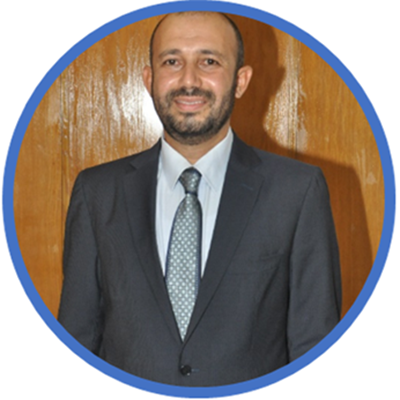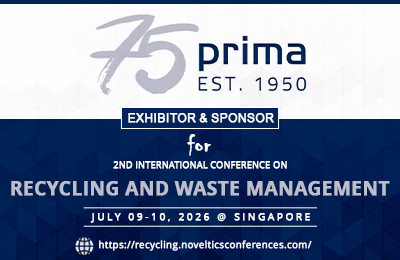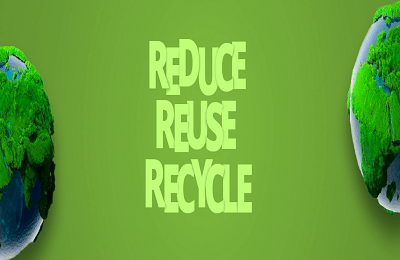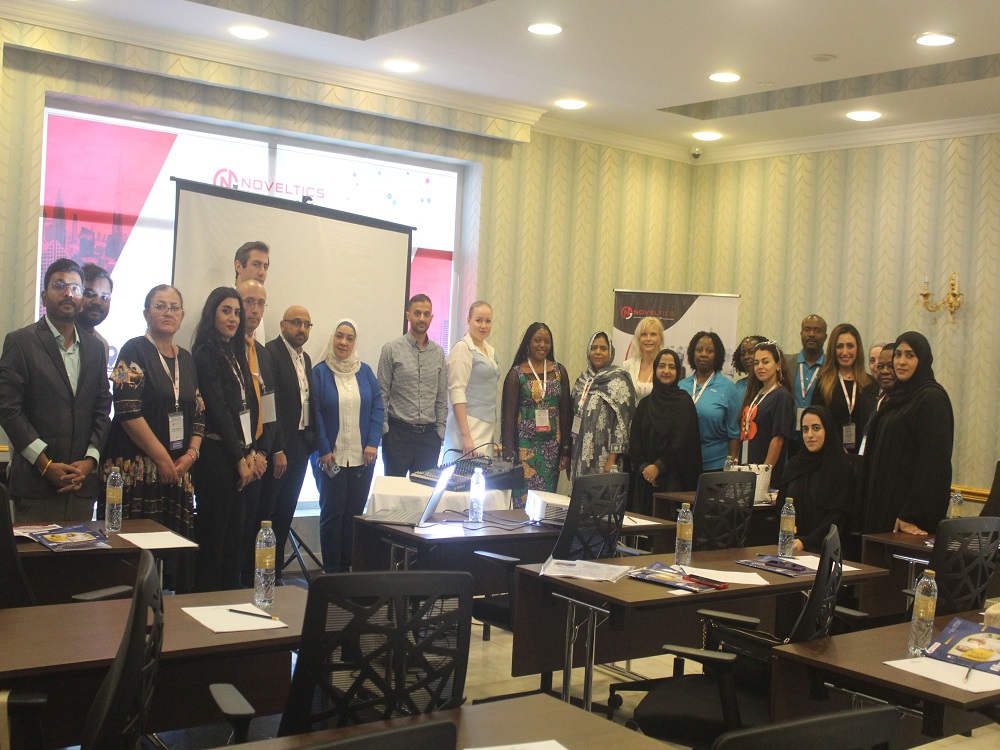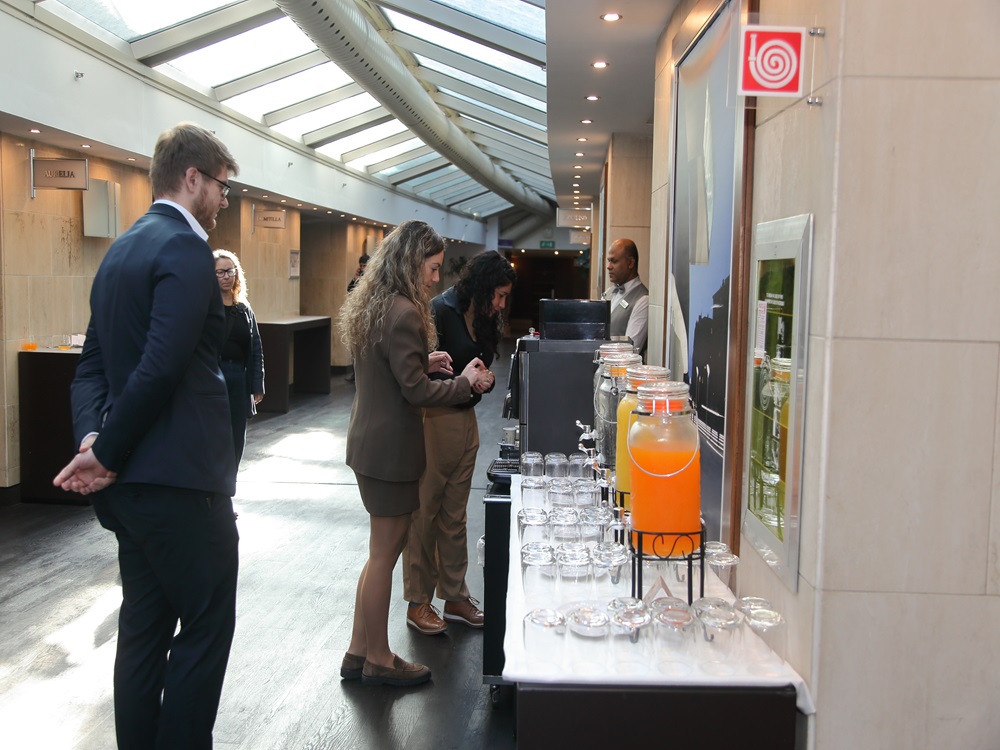Session 01: Recycling Innovations
Recycling innovations encompass ground breaking technologies and practices that are revolutionizing the recycling industry. These advancements aim to make recycling more efficient, cost-effective, and environmentally friendly. From advanced sorting systems to innovative recycling processes, these innovations are critical in our quest to reduce waste, conserve resources, and promote sustainability. They play a pivotal role in addressing modern environmental challenges and shaping a greener, more sustainable future.
• Technological Advancements
• Policy and Incentives
• Sustainable Solutions
• Specific Material Innovation
Session 02: Sustainable Materials Management
Sustainable Materials Management is an approach that focuses on optimizing the use of materials and resources throughout their lifecycle, from production to consumption and disposal. It emphasizes reducing waste, conserving resources, and minimizing environmental impacts. By promoting responsible production, consumption, and waste management practices, Sustainable Materials Management contributes to environmental protection, economic efficiency, and long-term sustainability. It's a key strategy in the transition to a circular economy and plays a vital role in minimizing the environmental footprint of products and materials.
• Lifecycle Perspective
• Resource Conservation
• Economic Benefits
Session 03: Environmental Policy and Regulations
Environmental policy and regulations encompass a set of laws, rules, and guidelines established by governments and regulatory bodies to safeguard the environment. These policies aim to address various environmental issues, including pollution control, resource conservation, and ecosystem protection. By setting standards and guidelines for industries, businesses, and individuals, environmental policy and regulations work to mitigate environmental harm, promote sustainable practices, and ensure compliance with legal requirements.
• Circular Economy
• Green Finance
• Environmental Technology and Innovation
• Trade and Environment
• Education and Public Awareness
Session 04: Recycling and Industry Partnerships
Recycling and industry partnerships refer to collaborations between the recycling sector and various industries, such as manufacturing, retail, and municipalities, with the goal of advancing sustainable waste management practices. These partnerships are essential for creating a closed-loop system where materials are efficiently reused, reducing waste and environmental impact. By working together, industries can develop innovative solutions, improve recycling infrastructure, and enhance the overall sustainability of their operations.
• Public-Private Partnerships
• Extended Producer Responsibility (EPR)
• Industry Consortiums and Collaborations
• Community-Industry Partnerships
Session 05: Recycling Technologies Showcase
The Recycling Technologies Showcase is an event that brings together industry leaders, innovators, and experts to showcase the latest advancements and technologies in the field of recycling. The showcase provides a platform for companies to exhibit their innovative recycling solutions, ranging from plastic recycling to e-waste recycling and more. Attendees can learn about cutting-edge recycling technologies, network with industry professionals, and gain insights into the future of recycling.
• AI-Powered Sorting Systems
• Chemical Recycling
• Plasma Gasification
• Advanced Composting
• Recycling Robots
• Eco-Friendly 3D Printing Filaments
Session 06: Waste Management Techniques
Waste management techniques encompass a range of methods and strategies designed to handle, control, and reduce waste in an efficient and environmentally responsible manner. These techniques include waste collection, transportation, recycling , composting, incineration, and landfill disposal. The goal of waste management is to minimize the environmental impact of waste while optimizing resource recovery and energy production. Effective waste management techniques are essential for conserving resources, preventing pollution, and promoting a more sustainable and cleaner environment.
Session 07: E-Waste Recycling and Management
E-Waste (Electronic Waste) recycling and management refer to the responsible and eco-friendly handling of discarded electronic devices and equipment, such as computers, smartphones, and televisions. This specialized branch of waste management involves collecting, processing, and recycling electronic waste to recover valuable materials while mitigating environmental and health risks associated with improper disposal. E-waste recycling not only conserves resources but also reduces hazardous e-waste pollution, making it a crucial practice in today's digital age.
• The Growing E-Waste Crisis
• Policy and Regulatory Landscape
• Technological Innovation and Solutions
• The Future of E-Waste Recycling
Session 08: Solid Waste Management
Solid waste management is a comprehensive approach to the collection, transportation, disposal, and recycling of solid waste materials, such as household garbage, industrial waste, and construction debris. The primary goal of solid waste management is to minimize the environmental impact of waste while optimizing resource recovery and promoting public health and safety. It involves the implementation of efficient waste collection systems, sustainable disposal methods, recycling programs, and environmental initiatives to reduce waste generation.
• Waste Generation and Characterization
• Waste Collection and Transportation
• Waste Processing and Treatment
• Future Trends and Innovations
Session 09: Wastewater Recycling
Wastewater recycling, also known as water reclamation or water reuse, is the process of treating and purifying wastewater to make it safe for reuse in various applications. This sustainable approach helps conserve water resources, reduce pollution, and minimize the strain on freshwater sources. Wastewater recycling involves advanced treatment technologies to remove contaminants and pathogens, making the water suitable for purposes like agricultural irrigation, industrial processes, and even potable water supply.
• Wastewater Treatment Technologies
• Applications of Recycled Water
• Policy and Regulatory Landscape
• Emerging Trends and Innovations
Session 10: Paper Recycling
Paper recycling is the practice of collecting, processing, and reusing paper and paper products to minimize waste and promote sustainability. This essential aspect of recycling helps conserve valuable resources and reduce the environmental impact of paper production. The process typically involves the collection of used paper, the removal of contaminants, and the creation of recycled paper products, such as newspapers, cardboard, and office paper.
• Deinking Technologies
• Closed-Loop Systems in Paper Recycling
• Innovations in Paper Recycling Technologies
• Life Cycle Assessment of Paper Products
Session 11: Industrial Waste Recycling
Industrial waste recycling is a critical practice aimed at managing and repurposing waste generated by industrial processes and manufacturing. It involves the collection, separation, and processing of various industrial byproducts, such as scrap metal, plastics, chemicals, and hazardous materials, with the objective of reducing environmental impact and promoting sustainability. Recycling industrial waste not only minimizes disposal costs but also conserves resources, reduces energy consumption, and mitigates pollution.
• Waste Stream Analysis in Industries
• Closed-Loop Systems for Industrial Waste
• In-Plant Recycling Processes
• Waste Heat Recovery in Industries
Session 12: Chemical Waste Recovery
Chemical waste recovery is the process of collecting, treating, and reusing or recycling hazardous waste materials that are generated during various industrial processes. These waste materials may include acids, solvents, and other chemicals that can be harmful to the environment and human health if not disposed of properly. The recovery process involves separating and purifying the waste materials so that they can be reused or recycled in other processes, reducing the need for new raw materials and minimizing the impact on the environment.
• Chemical Recovery Technologies
• Metal Recovery from Chemical Waste
• Chemical Waste-to-Energy Conversion
• Adsorption and Absorption Technologies
• Waste Acid Recycling
Session 13: Food Waste Recycling
Food waste recycling is the process of converting food waste into useful products such as compost, animal feed, and biofuels. The process involves collecting food waste from households, restaurants, and other food establishments, and then processing it through various methods such as composting, anaerobic digestion, and mechanical biological treatment. The end product is then used to enrich soil, feed animals, or generate energy. Food waste recycling helps to reduce the amount of waste sent to landfills, which in turn reduces greenhouse gas emissions and helps to preserve natural resources.
• Anaerobic Digestion of Food Waste
• Vermicomposting
• Bioenergy Production from Food Waste
• Food Waste-to-Animal Feed Conversion
Session 14: Agricultural Waste Recycling
Agricultural waste recycling involves the proper disposal and recycling of waste generated from agricultural activities. This waste includes crop residues, animal manure, and other organic materials. Recycling agricultural waste can be done through composting, where the waste is decomposed and converted into nutrient-rich compost that can be used as fertilizer. Additionally, anaerobic digestion can be used to convert agricultural waste into biogas, which can be used as a renewable energy source. Recycling agricultural waste helps to reduce pollution, conserve resources, and promote sustainable agricultural practices. It also contributes to soil fertility and reduces the need for chemical fertilizers.
Session 15: Rubber Recycling
Rubber recycling is the eco-conscious process of collecting and repurposing rubber materials, such as tires and rubber products, to minimize waste and promote sustainability. This practice involves collecting used rubber items, processing them into manageable pieces, and then reclaiming valuable rubber compounds for use in various applications. These recycled materials find new life in products like playground surfaces, athletic tracks, and even new tires.
Session 16: Metal and Plastic Recycling
Metal recycling involves the collection, sorting, and processing of scrap metal to recover valuable materials and reduce the demand for virgin metals. The process involves melting down the metal and refining it to remove impurities before it is sold to manufacturers to create new products. Plastic recycling involves the collection, sorting, and processing of plastic waste to create new products.
Session 17: Circulatory Economy
A circular economy is a transformative economic model designed to minimize waste, conserve resources, and promote sustainability. In a circular economy, products and materials are reused, repaired, remanufactured, and recycled to the greatest extent possible. This contrasts with the traditional linear economy, where products are made, used, and then disposed of as waste.
Session 18: Thermal Waste Recovery
Thermal waste recovery is an environmentally responsible approach to waste management that harnesses the energy potential of waste materials. This process involves subjecting waste to high temperatures through methods like incineration or pyrolysis. As the waste is heated, it transforms into valuable energy sources, such as heat, electricity, biofuels, and syngas. Thermal waste recovery reduces waste volume, minimizes landfill reliance, and provides sustainable energy solutions.
Session 19: Recycling Business and Marketing
Recycling businesses play a crucial role in transforming waste materials into reusable resources, helping to conserve natural resources and reduce environmental impact. They collect, process, and resell recycled materials like paper, plastic, metal, and glass to manufacturers for creating new products. Marketing in the recycling industry focuses on promoting the environmental and economic benefits of recycling, targeting businesses, governments, and consumers. Effective strategies include emphasizing sustainability, showcasing cost savings, and highlighting the positive impact on the environment, thereby attracting customers and partners committed to green practices.
